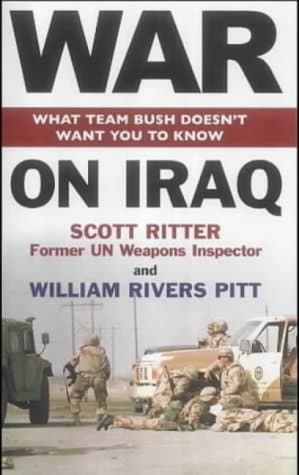
Scott Ritter & William Rivers Pitt, War on Iraq: What Team Bush Doesn't Want You to Know
Value For Money
Scott Ritter & William Rivers Pitt, War on Iraq: What Team Bush Doesn't Want You to Know
When you purchase through links on our site, we may earn an affiliate commission. Here's how it works.

User Reviews
Value For Money
War On Iraq Scott Ritter & William Rivers Pit
War On Iraq
Scott Ritter & William Rivers Pitt
2002
U.K. Profile Books, U.S. Context Books
__________________________________
"We write to taste life twice, in the moment, and in retrospection." -
Anais Nin
Today there were another 16 US casualties in Iraq (BBC News 03/11/2003). This follows on the heels of the announcement that more British soldiers have been killed since the official end of the war in Iraq than during the conflict itself (BBC News 29/10/2003). The same division in the death toll has long been echoed by U.S. Defense Department figures. The U.S. and U.K. governments insist that the continued presence of allied forces in Iraq is justified. This largely relies on the soldiers being presented as "liberators", a notion currently rejected by 85% of Iraqis (USATODAY.com 29/10/2003). The reason for allied forces being there at all seems to depend on the existence of Weapons of Mass Destruction. As we all know, these weapons have yet to be found and even former U.N. chief weapons inspector Hans Blix has recently expressed doubts about the veracity of such claims (Toronto Star 21/09/2003). Scott Ritter is another former UN weapons inspector who preceded Blix in doubting the existence of Iraq's Weapons of Mass Destruction. The difference is that he published his concerns in "War On Iraq" in 2002 (U.K. Profile Books, U.S. Context Books) before war was even waged. The luxury of hindsight allows us to see if Ritter's predictions have stood the test of time, however brief.
In addition to the lack of Iraqi Weapons of Mass Destruction, Ritter chiefly proposed that deposing Saddam Hussein would be ineffectual, simply leading to an alternative head of the ruling Sunnis. Whilst this hasn't been born out as yet, the 'Sunni Triangle', the Sunni Muslim-dominated area north and west of Baghdad, has remained loyal to Saddam Hussein and is proving most resistant to American-led reconstruction of the Iraqi administration. Ritter also predicted that Turkey would provide military bases for U.S. forces only if Kurdish independence was blocked. Indeed, the Kurds have been included in talks about regime change with Defense Secretary Donald Rumsfeld and Vice President Dick Cheney, while Turkey has stepped down from its March 1st. position denying U.S. troops the use of bases in Turkey only enough to allow coalition planes through their airspace. But they currently parry and thrust with the U.S. over southern Kurdistan. Meanwhile, Ritter's suggestions that the Kurds would be suspicious of U.S. designs for Iraq seem to be coming true; the perception of U.S. troops as occupiers has grown most sharply in Shia and Kurdish cities.
"War On Iraq" is mainly an interview held by author and Truthout.org
Managing Editor William Rivers Pitt. Ritter's experiences in the field as a weapons inspector and intelligence officer back up his answers, and his arguments are persuasive, although some questioning is clearly biased in order to forward him as a patriot and innocent victim of his sex scandal slur. During the interview, Ritter provides systematic evidence in contradiction of estimates of Iraqi pre-war military strength, the threat
cited in the U.S. and U.K. rationale for war. It is notable then that
there are only a handful of reviews at Amazon.co.uk, all positive about the book and anti-war, in contrast to the more numerous, often heated and
agressive, defenders of the war who have posted their thoughts about the
book and its authors at Amazon.com. However, the American readers are split amongst themselves, fairly evenly awarding the highest and lowest scores.
Since the official end of the war, both sides of the Altantic have become engrossed with internally-focused enquiries that only peripherally attend to the apparent manipulation of military intelligence about Weapons of Mass Destruction. In the U.K. the Hutton Enquiry investigated the death of a leading scientist, and the U.S. intelligence bureau is considering the intimidation of a retired Ambassador. It seems that these are easier questions to answer than discovering the true reasons behind 'Operation Enduring Freedom'. In the absence of any substantiated argument from the people who took America and Britain to war, perhaps Ritter's is the best account that we have.
J.F.Derry
30/10/2003
Q&A
There are no questions yet. Be the first to ask a question.